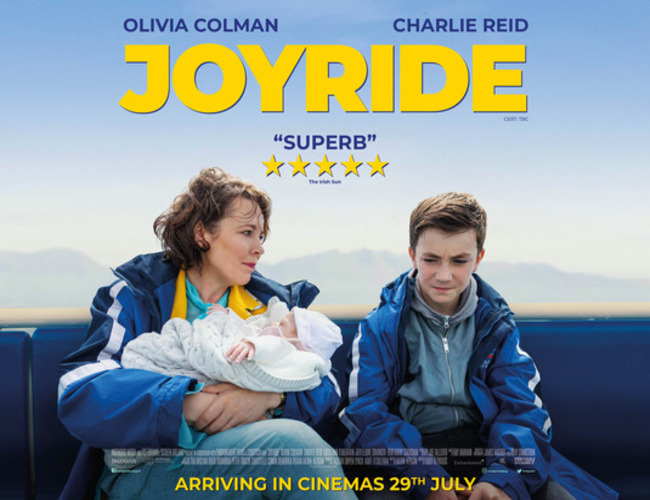One of the great weights that hang, albatross-like, around our necks as we go through life, is that things are supposed to happen a certain way.
Somehow our collective consciousness as a society has decided that, whatever the circumstance and no matter how individual the experience, we must all go through the exactly the same steps to, and here’s another weird point of unthinking ordained conformity, some sort of neat and tidy resolution that often has more to do with what makes others comfortable than what we need.
Two characters who know more than a little bit about this, though not consciously as they are both over their heads in their respective temporary hellholes when we meet them at the start of Ireland-set Joyride, and not really able to stand back and compare the stark reality of their currently messy lives with the way things are supposed to be proceedings – it would do them much good to do that anyway, now would it, even if they were capable of that kind of dispassionate comparison – are Mully (Charlie Reid) and Joy (Olivia Colman) who vastly different people who discover they might need each other more than either ever conceives at the start.
They meet under very unusual circumstances which a considerable way to explaining why it is they don’t exactly see eye-to-eye at first.
Caught up in the bewildering grief of his beloved mum Rita’s (Elaine Kennedy) passing, a devastating chasm in the young teenager’s life which leaves with only his unseen sister and his shiftless dad James (Lochlann O’Mearáin) who cares more about keeping violent debt collectors of his back than his son’s welfare, Mully runs from the pub he works at one night with a big lump of money raised by the establishment’s patrons for the hospice where his mum died.
His dad wants to take the money to satisfy his debts, but knowing it’s wrong and that Rita, who loved her son with a nurturing passion, would hate the theft of money raised to benefit others, Mully absconds with it, stealing a taxi to get away from his dad, a taxi in which Joy, a solicitor caught in post-partum depression of the most virulently disorienting kind, is asleep waiting transport to a ferry and then plane to escape the pain of her current existence.
Joy may be desperately sad and determined to give her baby way to her sister but she’s also opinionated and feisty and when she awakes to discover Mully has accidentally kidnapped her and her baby Robin, she is none too please, setting off the mother of all contentious road trips as Joy sets out to realise her plan to give away her baby and then escape somewhere that’s not her hometown, and Mully, by way of contrast, simply wants to get away from his dad, preferably not where Joy is going.
It’s a meet-cute of sorts on very unhappy steroids as two people caught in two very different kinds of grief and pain who are wrestling with the sharp divide between society’s expectations and unpalatable reality struggle to meet some sort of commonality while they try to deal with their existential crises, ill-equipped to know what the next step might be, let alone whether they have the will and emotional strength to take it.
As they draw closer and pull apart, exchanges characterised by witty oneliners, iron wills and pain looking for some sort of expression, however broken, Mully and Joy come to understand they might be more kindred of spirit than either even realised.
Both writer Ailbhe Keogan and director Emer Reynolds seem to implicitly understand that when people are weighed down by what society tells them they should want and how they should behave – Joy should keep her baby and not be grief-stricken at all during such a wondrous time and Mully should get over his grief and move in with life his uncaring father – and the cataclysmic pain of what they are actually going through, they rarely can see the emotional forest for the trees.
All throughout their unusually charged journey, which wraps itself around a taut and tight radius around their hometown in a way that suggests the two, who actually know each other indirectly, neither Joy nor Mully fully appreciate how much they actually need each other, something that makes sense because Joyride takes the time to establish how raw and unsettlingly bleak temporarily broken humanity can be.
Neither Joy nor Mully are in their right minds or hearts, which means that while they are capable of acts of real tenderness and concern to each other such as when Mully, whose sister has just had a baby, teaches Joy how to get her daughter to feed from her properly – one of the sources of Joy’s distress is that she can breastfeed her daughter, leading her to believe she’s going to be as bad a mother as her own indifferent mum – they can’t see the implicit connection that develops between them.
That they eventually do speaks to the warmhearted final act of this affectingly good and emotionally measured film which deals with some big emotions and epically funny and soberingly serious moments with a nuance that understands how complicated and messy people can be.
The great and gloriously affirming truth of Joyride is that we are always caught between painful truth and abstract expectation and they real freedom and emotional release comes when we cast all that aside and simply deal with our lives as they really are.
It takes bravery and real honesty to do it, which takes both characters a wild to find, but when they do, Joyride comes even more heart-affirmingly alive, reminding us that even in the very worst of times, and good lord Joy and Mully are definitely there with weighted bells on, beautiful things can happen and we can find our own paths to whatever awaits whenever and however that may be.
